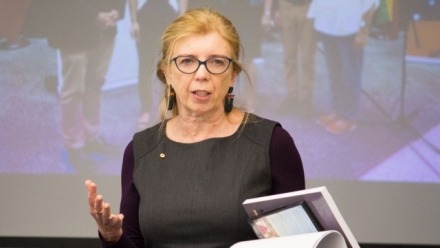Speakers from around Australia and the world have recently come together at ANU for the Deep Human Past’s Inaugural International Symposium.
The symposium was convened by Professor Ann McGrath and Dr Laura Rademaker from ANU School of History, and ANU alumna Professor Jaky Troy, Director of Aboriginal and Torres Strait Islander Research at University of Sydney. Professor McGrath and Dr Rademaker are part of the ARC Laureate Program for the Deep Human Past at ANU, an ambitious project aiming to change the way we understand pre-colonial history of Australia and beyond.
Bringing together talents from across a variety of disciplines including history, linguistics, the arts, anthropology and philosophy as well as experienced Indigenous practitioners, the symposium explored the various ways history is conceived and recorded.
The symposium was opened by Professor Richard Baker, Pro Vice-Chancellor (University Experience), and Tyronne Bell, who offered the Welcome to Country.
Professor Jacky Troy delivered a keynote, offering a personal perspective on Indigenous exploration of place and time.
Dr Catherine Frieman from ANU School of Archaeology and Anthropology delivered a presentation on the temporality of archaeological narratives, while Dr Rademaker touched on themes in her new book Found in Translation looking at Aboriginal and missionary conventions.
The symposium also heralded a unique collaboration between the research schools of the ANU College of Arts and Social Sciences, with leading international composer Andreia Pinto Correia appointed a joint visitor. Based in the ANU School of Music, where she shared her professional insights with students, Andreia composed an original flute piece entitled Pleistocene Landscapes in honour of Professor McGrath’s work. The piece interpreted the changing sands of time with a particular emphasis on the Lake Mungo region. Inspired by a place Andreia had then seen only in the film Message from Mungo proved a creative challenge for the experienced composer. But embracing the challenges, she produced a unique piece, making creative use of extended technique on the flute, to produce sounds and rhythms evocative of wind, and the movement of the grains of sand, to evoke a place of deep history and a long civilization.
In its stunning world premiere, Pleistocene landscapes was performed on alto-flute by Canberra musician Kiri Sollis, of the Griffyn Ensemble.


